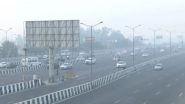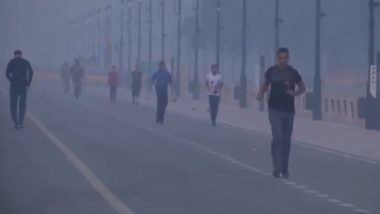New Delhi, November 14: With the air quality index (AQI) in Delhi worsening and hovering in the severe category, the Commission for Air Quality Management (CAQM) has invoked stage three of the anti-pollution plan GRAP. GRAP stage 3 involved a complete halt on construction and demolition work except for essential government projects, mining and stone crushing and aban on BS III petrol and BS IV diesel vehicles in Delhi and surrounding areas.
The Graded Response Action Plan (GRAP) for the National Capital Region (NCR) is classified under four different stages of adverse air quality in Delhi: Stage I -- 'poor' (AQI 201-300); Stage II -- 'very poor' (AQI 301-400); Stage III -- 'severe' (AQI 401-450); and Stage IV -- 'severe plus' (AQI >450). Delhi Air Pollution: GRAP 3 to Be Imposed in National Capital from November 15, Know What is Banned and What is Allowed.
The CAQM Sub-Committee, after an urgent review meeting on November 14, noted that since November 13, the AQI in Delhi had remained firmly in the "Severe" range, with forecasts indicating that it could stay at the higher end of the "Very Poor" category in the coming days.
"The Sub-Committee decided that ALL actions as envisaged under Stage III of the GRAP-'Severe' Air Quality (DELHI AQI ranging between 401-450) be implemented in right earnest by all the agencies concerned in the NCR, in addition to the Stage-I and II actions already in force, from 8:OO A.M. of 15th November, 2o24 in the National Capital Region (NCR)," the CAQM order read. Delhi-NCR Air Pollution: Residents Wake Up to Dense Smog As AQI Reaches 430, Marking Second Day of Hazardous Pollution Level (Watch Videos).
This year, Stage III has been invoked much later than in 2023, when it was activated on November 2nd. The action plan, effective across the entire NCR, will supplement ongoing Stage-I and Stage-II measures already in place.
The 11-point action plan under Stage III includes increased road sweeping, intensified water sprinkling with dust suppressants in high-traffic areas, and enhanced public transport services with differential pricing to encourage off-peak travel.
Additionally, a strict ban has been imposed on dust-generating construction and demolition activities, with only essential projects related to national security, healthcare, and public infrastructure allowed to continue under strict environmental controls.
Polluting industries, including stone crushers and mining operations, will be shut down, and there will be restrictions on the movement of BS-III petrol and BS-IV diesel vehicles in Delhi and neighbouring districts. Interstate buses not meeting environmental standards will also be barred from entering the city. Authorities are also considering switching to online classes for children up to Class V to reduce exposure to harmful air quality.
The CAQM has urged citizens to follow the guidelines under Stage III, including choosing cleaner modes of transport, working from home when possible, and avoiding the use of coal and wood for heating. The CAQM appealed for public cooperation in ensuring the successful implementation of these measures to reduce the health risks posed by the severe pollution in the region.
A dense layer of smog enveloped the national capital as the pollution levels continued to rise. The AQI level in Delhi at 1 pm was 425, as per the Central Pollution Control Board (CPCB).
(The above story is verified and authored by ANI staff, ANI is South Asia's leading multimedia news agency with over 100 bureaus in India, South Asia and across the globe. ANI brings the latest news on Politics and Current Affairs in India & around the World, Sports, Health, Fitness, Entertainment, & News. The views appearing in the above post do not reflect the opinions of LatestLY)













 Quickly
Quickly


